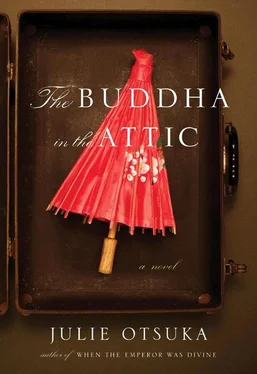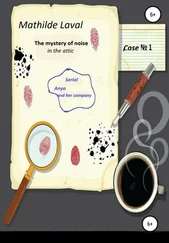A FEW OF US on the boat never did get used to being with a man, and if there had been a way of going to America without marrying one, we would have figured it out.
ON THE BOAT we could not have known that when we first saw our husbands we would have no idea who they were. That the crowd of men in knit caps and shabby black coats waiting for us down below on the dock would bear no resemblance to the handsome young men in the photographs. That the photographs we had been sent were twenty years old. That the letters we had been written had been written to us by people other than our husbands, professional people with beautiful handwriting whose job it was to tell lies and win hearts. That when we first heard our names being called out across the water one of us would cover her eyes and turn away —I want to go home— but the rest of us would lower our heads and smooth down the skirts of our kimonos and walk down the gangplank and step out into the still warm day. This is America , we would say to ourselves, there is no need to worry . And we would be wrong.
That night our new husbands took us quickly. They took us calmly. They took us gently, but firmly, and without saying a word. They assumed we were the virgins the matchmakers had promised them we were and they took us with exquisite care. Now let me know if it hurts . They took us flat on our backs on the bare floor of the Minute Motel. They took us downtown, in second-rate rooms at the Kumamoto Inn. They took us in the best hotels in San Francisco that a yellow man could set foot in at the time. The Kinokuniya Hotel. The Mikado. The Hotel Ogawa. They took us for granted and assumed we would do for them whatever it was we were told. Please turn toward the wall and drop down on your hands and knees . They took us by the elbows and said quietly, “It’s time.” They took us before we were ready and the bleeding did not stop for three days. They took us with our white silk kimonos twisted up high over our heads and we were sure we were about to die. I thought I was being smothered . They took us greedily, hungrily, as though they had been waiting to take us for a thousand and one years. They took us even though we were still nauseous from the boat and the ground had not yet stopped rocking beneath our feet. They took us violently, with their fists, whenever we tried to resist. They took us even though we bit them. They took us even though we hit them. They took us even though we insulted them— You are worth less than the little finger of your mother —and screamed out for help (nobody came). They took us even though we knelt down at their feet with our foreheads pressed to the ground and pleaded with them to wait. Can’t we do this tomorrow? They took us by surprise, for some of us had not been told by our mothers exactly what it was that this night would entail. I was thirteen years old and had never looked a man in the eye . They took us with apologies for their rough, callused hands, and we knew at once that they were farmers and not bankers. They took us leisurely, from behind, as we leaned out the window to admire the city lights down below. “Are you happy now?” they asked us. They tied us up and took us facedown on threadbare carpets that smelled of mouse droppings and mold. They took us frenziedly, on top of yellow-stained sheets. They took us easily, and with a minimum of fuss, for some of us had been taken many times before. They took us drunkenly. They took us roughly, recklessly, and with no mind for our pain. I thought my uterus was about to explode . They took us even though we pressed our legs together and said, “Please, no.” They took us cautiously, as though they were afraid we might break. You’re so small . They took us coldly but knowledgeably —In twenty seconds you will lose all control —and we knew there had been many others before us. They took us as we stared up blankly at the ceiling and waited for it to be over, not realizing that it would not be over for years. They took us with the assistance of the innkeeper and his wife, who held us down on the floor to keep us from running away. No man will want you when he’s done . They took us the way our fathers had taken our mothers every night in the one-room hut back home in the village: suddenly, and without warning, just as we were drifting off into sleep. They took us by lamplight. They took us by moonlight. They took us in darkness, and we could not see a thing. They took us in six seconds and then collapsed on our shoulders with small shuddering sighs, and we thought to ourselves, That’s it? They took forever, and we knew we would be sore for weeks. They took us on our knees, while we clung to the bedpost and wept. They took us while concentrating fiercely on some mysterious spot on the wall that only they could see. They took us while murmuring “Thank you” over and over again in a familiar Tohoku dialect that immediately set us at ease. He sounded just like my father . They took us while shouting out in rough Hiroshima dialects we could barely understand and we knew we were about to spend the rest of our life with a fisherman. They took us upright, in front of the mirror, and made us stare at our reflection the whole time. “You will come to like it,” they said to us. They took us politely, by our wrists, and asked us not to scream. They took us shyly, and with great difficulty, as they tried to figure out what to do. “Excuse me,” they said. And, “Is this you?” They said, “Help me out here,” and so we did. They took us with grunts. They took us with groans. They took us with shouts and long-drawn-out moans. They took us while thinking of some other woman—we could tell by the faraway look in their eyes—and then cursed us afterward when they could find no blood on the sheets. They took us clumsily, and we did not let them touch us again for three years. They took us with more skill than we had ever been taken before and we knew we would always want them. They took us as we cried out with pleasure and then covered our mouths in shame. They took us swiftly, repeatedly, and all throughout the night, and in the morning when we woke we were theirs.
We settled on the edges of their towns, when they would let us. And when they would not— Do not let sundown find you in this county , their signs sometimes said—we traveled on. We wandered from one labor camp to the next in their hot dusty valleys—the Sacramento, the Imperial, the San Joaquin—and side by side with our new husbands, we worked their land. We picked their strawberries in Watsonville. We picked their grapes in Fresno and Denair. We got down on our knees and dug up their potatoes with garden forks on Bacon Island in the Delta, where the earth was spongy and soft. On the Holland Tract we sorted their green beans. And when the harvest season was over we tied our blanket rolls onto our backs and, cloth bundles in hand, we waited for the next wagon to come, and we traveled on.
THE FIRST WORD of their language we were taught was water . Shout it out, our husbands told us, the moment you begin to feel faint in the fields. “Learn this word,” they said, “and save your life.” Most of us did, but one of us—Yoshiko, who had been raised by wet nurses behind high-walled courtyards in Kobe and had never seen a weed in her life—did not. She went to bed after her first day at the Marble Ranch and she never woke up. “I thought she was sleeping,” said her husband. “Heatstroke,” the boss explained. Another of us was too shy to shout and knelt down and drank from an irrigation ditch instead. Seven days later she was burning up with typhoid. Other words we soon learned: “All right”—what the boss said when he was satisfied with our work—and “Go home”—what he said when we were too clumsy or slow.
Читать дальше












